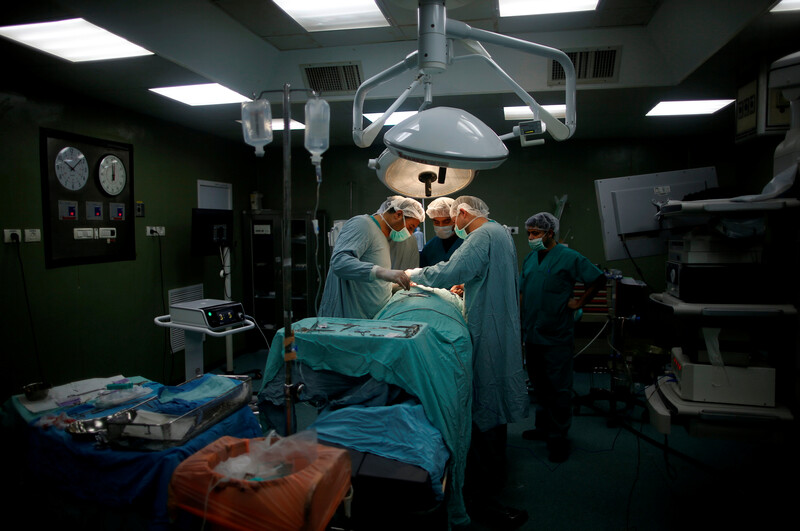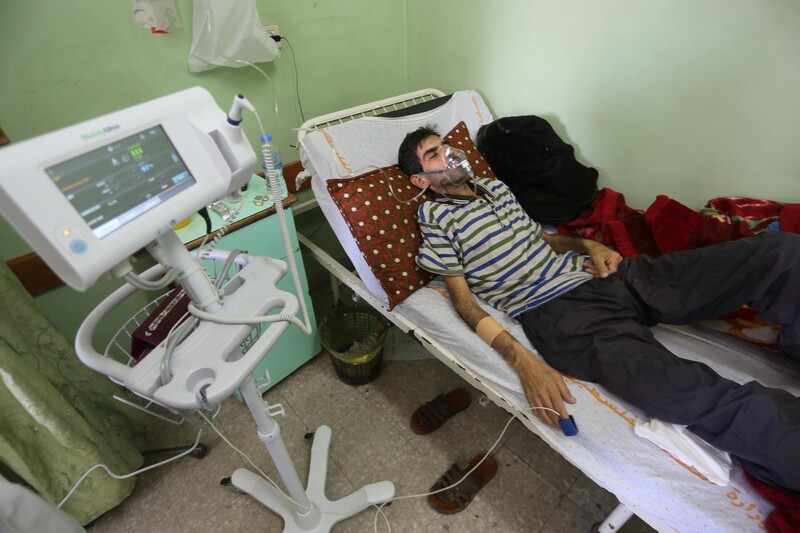Surgeries cut by one-third in Gaza’s main hospital
Doctors perform surgery on a Palestinian woman at al-Shifa hospital, Gaza’s largest public medical facility, in Gaza City, in March. A third of surgeries are now being postponed due to the deepening electricity crisis in the territory.Reuters/Newscom




Fayez Ahmed needs surgery for an abcess in his lung. But doctors at Gaza’s al-Shifa hospital have repeatedly postponed the procedure because they can’t guarantee electricity will stay on long enough to keep vital equipment running during the six-hour operation.Mohammed Asad
Fayez Ahmed’s operation was supposed to last six hours.
With Gaza beset by power cuts, his medical team could not guarantee an uninterrupted electricity supply for that length of time. After weeks of delays, Ahmed decided to discharge himself from the hospital without having the surgery he needed to remove an abscess from his lung.
“That’s it,” he said. “I cannot wait any longer.”
Ahmed has been seeing doctors in al-Shifa hospital in Gaza City, Gaza’s largest hospital. Many others with lung and respiratory complaints have struggled to cope with regular power cuts.
Anwar Jundia, now aged 56, had one kidney fail in 2015. He was also diagnosed with asthma around that time.
Jundia is being treated at the chest department in al-Shifa. The equipment needed to help him breathe is often not functioning because of power cuts.
The equipment “switches on and off tens of times every day,” he said.
Walid Daoud, a doctor at al-Shifa, described the operations required by some patients with respiratory complaints as “sensitive and extremely dangerous.”
“We have to ensure that there is a continuous flow of oxygen into the patient’s lungs,” he said. “It’s not like a procedure for toothache or something else that can be done without electricity.”
“Tense atmosphere”
Fayez Ahmed is among the patients who have been treated by Daoud.
“If Fayez does not have this critical operation, he will need an oxygen concentrator at his home,” said Daoud. “That would cost $5,000 and I do not think Fayez can afford that.”
Daoud said that on one recent occasion procedures were abruptly halted because of a blackout. It took some time to reactivate the generator on which the hospital now relies.
“Doctors have been sweating a great deal,” he said. “There is a tense atmosphere in the operating theaters. Summer has also come early and it’s very hot.”
The people of Gaza are suffering both because of Israel’s decade-long blockade and disputes between the rival Palestinian parties of Fatah and Hamas.
Until recently, the Palestinian Authority, which is headquartered in the occupied West Bank, had been paying Israel to supply fuel for Gaza’s only power plant.
In April, the Fatah-dominated PA informed Israel that it was halting its payments for fuel. The notice was given as relations between Fatah and Hamas soured.
Since then, the power plant has been forced to close.
In May, following the PA maneuver, Israel’s cuts reduced electricity in Gaza even further.
Last week a top UN official told the UN Security Council that all the warnings of a humanitarian crisis in Gaza due to the electricity shortage “are now a reality.”
Since April, according to Nickolay Mladenov, the UN special coordinator for the Middle East peace process, the majority of Palestinians in Gaza are receiving about four hours of electricity per day.
Mladenov added that hospitals in Gaza “are now forced to postpone elective surgeries and have already reduced 80 percent of cleaning, catering and sterilization services.”
Had it not been for an emergency fuel delivery by the UN late in April, more than 50 operation theaters, five kidney dialysis centers and a number of emergency departments would have had to close, Mladenov said.
Lives at risk
The International Committee of the Red Cross had already warned that a “public health and environment crisis is looming.”
The World Health Organization has also stated that the power shortages threaten thousands of lives.
Even before the closure, Gaza’s electricity supply had been inadequate and blackouts were common.
The fuel sold by Israel has accounted for most of the electricity consumed in Gaza.
Naeem al-Banna, a spokesperson for al-Shifa, said that the hospital has reduced surgeries by around one-third because of power cuts.
Some cases have been referred to other hospitals. Referrals do not guarantee treatment, however.
Gaza’s own hospitals are overstretched and essential medicines are lacking.
Israel has blocked numerous patients from leaving Gaza for treatment. The Rafah crossing between Gaza and Egypt is only opened intermittently.
Egypt kept the crossing closed for the entire month of April.
“It might get even worse,” al-Banna added. If current trends persist, the hospital may only have two or three hours of electricity per day.
Nuha al-Diri needs surgery for pulmonary edema, a fluid build-up in the lungs. The surgery would take six hours; it has been delayed because of power shortages.
The power shortages have meant that the oxygen concentrator she uses has stopped functioning properly. Her family has had to keep buying temporary oxygen tanks for her.
Her daughter Fatima said that the family cannot afford the extra costs.
Fatima and her brother are taking turns to look after their 53-year-old mother round-the-clock. Like many others, they are tired of being victims of a political situation beyond their control.
“Gaza should be protected by the official Palestinian government,” said Fatima. “The people of Gaza deserve to have their voices heard.”
Ahmad Kabariti is a freelance journalist based in Gaza.

